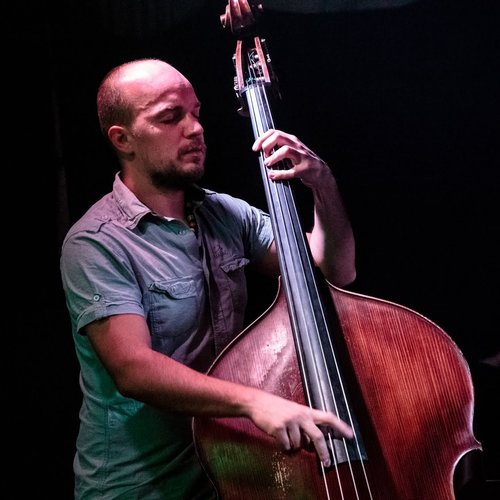Brazilian born
“Baião Frígio” opens the album. It’s the first ideal illustration of Lopes’ approach – the intensely rhythmic underpinning for the song has jazzy horns and rolling piano lines lain over the top for a satisfying effect. The song’s melodies are fluid and flowing, rushing forward at times before falling back into a more relaxed vibe. It’s a layered and evocative beginning to Caminhos. The second track “Gleisdreieck” continues along similar lines, but the energy level is a little more restrained and listeners may get the feeling Lopes and his cohorts are stretching out more with this performance. The percussion is less frantic during the opening minute before the composition has a stronger jazz flavor. Brass flourishes are intensely melodic, yet there seems to be a slightly melancholy mood laced through their playing. Lopes introduces prominent guitar during the second half that strikes up compelling interplay with the bass playing supporting it.
The title track “Caminhos” starts off in a pure jazz vein with slowly unfolding piano and the album’s first vocal. The female vocalist for the song envelops its mood with sure-handed artistry, shaping her phrasing to the movement of its arrangement, and never transcending language boundaries. It makes no difference if you only speak English; the yearning explorative spirit of her voice communicates all listeners needs to know. Lopes brings other instruments into the mix as it progresses and the evolution of this particular number rates as one of the album’s peak moments. “Das Schloss” often loosely translated as “the castle” or “the palace” from German, boasts an arrangement largely keyed by the interplay between bass, piano, and percussion, but a small bevy of horns introduce the track punctuate the song’s first half. They take on a lead role during the second for extended solos and clean rippling lead guitar answers its contributions. It’s an instrumental showcase and one of the album’s finest moments.
Giliard Lopes Jazzes It Up on Caminhos
“Pedra Furada” makes excellent use of woodwinds and lulling melodicism. It’s a song with, arguably, stronger personal underpinning for Lopes as the title refers to a vast series of archaeological sites scattered throughout Lopes’ native Brazil. The guitar work, torrid scat singing in the song’s second part, and the sustained brilliance of its drumming will impress anyone. Lopes’ composing talents and the playing skills of his collaborators allows him to draw from a bottomless pool of melody and thread improbable tempos into coherent threads of musical art.
The album’s conclusion “Chimango” begins with a moodier cast than anything thus far and all the earmarks of a composition aimed towards making a substantial statement. The female vocalist from the title song returns once again, but she has a less pronounced presence during the opening. Her voice soon gives way to horns leading the melody deeper into the arrangement and the album’s best guitar playing distinguishes the finale as well. Giliard Lopes’ Caminhos is an auspicious debut for the Brazilian born European transplant and the obvious creative vision powering this music promises even greater achievements to come.
Find more
-review by Mindy McCall









